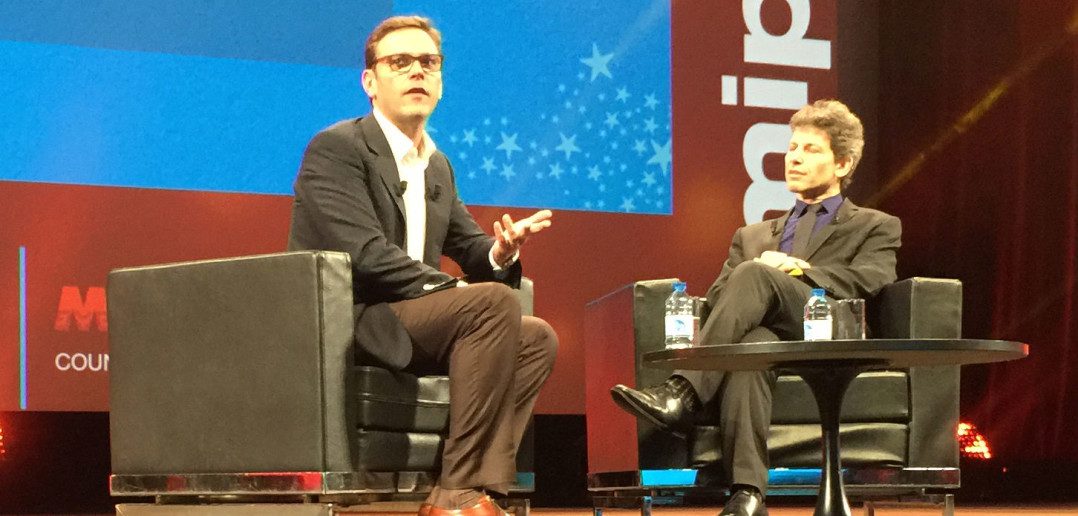The first in a pair of big-hitter Media Mastermind keynotes at MIPCOM this afternoon was James Murdoch, whose current position is co-chief operating officer at 21st Century Fox, working across its portfolio of businesses. But that role also includes direct responsibility for its television interests, from Fox in the US to BSkyB in the UK and STAR India. His keynote saw him interviewed on-stage by David Rowan, editor-in-chief of Wired Magazine.
What’s his mission? He noted that the journey started 30 years ago with the acquisition of the film studio, then Fox Network, then the Sky businesses. But it’s also « a business that’s just a year old… we’re trying to take what we believe and what we aspire to be one of the great homes for creativity and storytelling, and really take it forward many decades… we don’t always hit that mark, but that’s what we’re aspiring to do. »
« The business at the end of the day is really a digital video business. And it’s a business of ideas, » he said. « A lot of the business rules are kind of breaking down. The challenges that we face in one part of a world versus another are really very similar. »
Murdoch talked about how the company is structured. « When you have a strong team, and we have a very strong team of colleagues around us, we’re able to rely on them. We try to have a very collaborative culture. We’re sometimes not as collaborative as we should be. Sometimes more… We’re a very lean business. We have a very flat structure at the top, and we like to have our operating companies, the companies we’re invested in, be empowered and independent. »
When did he last call his father, Rupert Murdoch? « Two days ago. We all work very closely together. We speak all the time, but we’re always criss-crossing the world, so we talk a lot on the phone. »
Murdoch talked about the recently-announced merger of production companies Shine and Endemol. « We felt that the opportunity to create something that was really the global leader in terms of scale was something that shouldn’t be passed up, » he said. « We want to create something that can be a larger platform for them, a larger canvas, if you will… We really think that Shine and Endemol coming together is a very attractive opportunity. »
The two companies have around 600 different formats: at what point does a company become too big to be quick and nimble? « You can’t over-synergise in these businesses. You have to allow people to run their own show, to run their own shop if you will. And you want to create a platform for them to come together with the best people in the world to do that… You have to make sure that you’re not over-engineering the large scale of it. But where you can in terms of distribution, how commercially you go after the world, that’s where there are benefits. »
Are we in an era of rapid consolidation? « We’re already in it. We see it at the infrastructure business of the television business: cable and satellite, » he said. « We see an explosion in competition of the over-the-top business, whether they be a Sky Go or an Amazon or Netflix, and so forth. But in the upstream business, the copyright business, I do think we will see consolidation. »
Rowan asked about the summer’s bidding for Time Warner by 21st Cenury Fox, which eventually dropped its interest in what would have been an enormous media merger. « It was an oppornity at a moment in time when we thought a combination could be very attractive for both companies, » said Murdoch. « We really looked at it as an opportunity in time. Given the nature of these things, we don’t want to get into things like hostile takeovers… We’re highly confident in our business and our base plan. We’re a good size, we don’t see a lot of gaps. That was really an opportunistic thing at a moment in time, that we didn’t really want to drag out. »
21st Century Fox is completing the merger of its three Sky businesses in Europe, in the UK, Germany and Italy, where « we think that he combined entity can be a faster and better innovator » in areas like over-the-top services like Sky Go. « There’s a huge opportunity to accelerate the whole business, and as those businesses get into creating their own programming… we think at scale together we can do that even larger and even faster. And we want to. Europe in particular is a great opportunity for these kinds of studio businesses to do more. »
Rowan asked if his team can take risks and get them wrong. « You’d rather they didn’t exclusively get them wrong, » joked. What did he get wrong, wondered Rowan. « As a company we’ve definitely made investments that were challenging… famously as a company with MySpace, which was a total write-off and a disaster, » said Murdoch. He warned of the dangers of a large company getting « too risk-averse », before talking about some of the big risks. « I think all of our business is risk, » he said. « We like to look at a competitive landscape where you might have strong incumbents in a place, but we like to look at places where we think we can make a challenge. »
He added that investing in original programming is delaying some profits for the company. « That’s a risk. We made The Simpsons then acquired it for cable syndication in the US against a bunch of competition… and we’re making 100% of it available on an authenticated basis online. But we don’t know how customers are going to react. We hope they’re going to love it… but that was risky. »
Is this becoming a game where technology companies are in the driving seat? « I don’t think so. We work closely with Facebook particularly on a bunch of initiatives, » said Murdoch. « I think in the structure of the business – I mentioned the value of programming, copyrights going up, I think thats going to continue to be the case… you’re really shifting the value from downstream margin to upstream creators. The competition to be genuinely meaningful to customers is so intense, that investment needs to be made. »
Rowan wondered if millennials are going onto YouTube and other online sources, snacking rather than becoming customers for a fixed monthly satellite bill. « We live today in an environment that essentially is what I think Michael Powell called ultimate virality. This notion that everything is available that was ever made, to everyone everywhere. It’s driven by connectivity, by the economics of the cloud… That’s an enormously exciting time for customers. So the competitive set that we all operate in is vastly larger than it has ever been before… If you make a TV show today, you’re competing with every single TV show that’s ever been made before. »
He suggested that « it’s not going to be about everything being totally atomised, à la carte. Customers generally like bundling, because bundling drives prices down and drives consumption up ». Murdoch thinks that people will bundle things in different ways and « the stack will be re-ordered… but subscription television is alive and kicking, and it’s changing, driven by a competitive dynamic ».
What about online stars like PewDiePie and his huge viewing figures on YouTube? « People will watch a lot of stuff. Customers always and they should surprise us. You should never overestimate the customer satisfaction with the status quo. The diversity they can find online from GoPro or PewDiePie or whatever it is will occupy a lot of time and consumption, » he said, while stressing that this makes these exciting times for a company like 21st Century Fox, not a worrying time.
Will windowing survive in the TV world? « The business rules that we have, broadly as a TV industry where we have these windows that are set up that are largely set up – and I’m going to get in trouble with my colleagues for this – in order to make our product more available to customers, not less. Because you had a finite amount of inventory that you could fill up, » he said. « Now, serving ones and zeroes from the cloud in streaming services, the necessity of windowing from an infrastructure point of view, isn’t really there. »
He thinks there’ll be an evolution in the way windowing works, making it more flexible and delivering shows to people more quickly in different ways: « It’s simply a case of the market getting to a price for that, » he said. « I think windowing will survive ultimately. It should be driven by making the content more accessible. When it becomes a tool for limiting choice… then it will be a problem. And we have got make sure we don’t suffer from that kind of incumbency challenge as we go forward. »
Robert Thomson of News Corp recently called Google a platform for piracy. Is he right? « I think there’s no question that they can do more. A lot more. Certainly Google’s not right in saying they’re doing more than anyone. That just isn’t true, » he said. « The problem with Google… Actually, let’s not personalise this. The problem with search-driven discovery, if the content is there and it’s illegal and you’re just selling clicks as a big ad network, you have eery incentive for that illegal programming to be there… That’s fundamentally not really good enough. Copyright is the font of innovation on the scale of the last, whatever it was, 15th century statute that enshrined copyrights as the ability of an author and creator to feed themself… It’s important for governments to take it very seriously, for regulators to take it very seriously, and for infringers to be taken seriously, and for those who enable infringement to be held accountable. »
What did Murdoch learn from the more negative periods of the last couple of years? « Maybe you’re more high-profile than you would have chosen… » he said ruefully. « The main thing that I look at is actually… I think you have to lead through those things. All of your colleagues are going through the same thing that you are, even if you’re more high-profile. And you have to enable them to help you. That’s something that’s hard to do, but you find real strength within the organisation when it’s tested like that… And one quality that’s often overrated is sheer perseverance. Winston Churchill said ‘when you’re going through Hell, keep moving’. Perseverance is everything… It’s about strength of will and character. »
Last question: which new technology is Murdoch most excited about for five years’ time, in terms of TV? Murdoch mentioned the Oculus Rift virtual reality technology. « There’s a class of storytelling that’s benefiting from this technology, and the trajectory is towards immersion, towards entertainments that are indistinguishable from reality. We are on that path. It will not be appropriate for every type of storytelling.. but for certain types of storytelling it will be the most extraordinary experience… and it’s not science fiction. »




